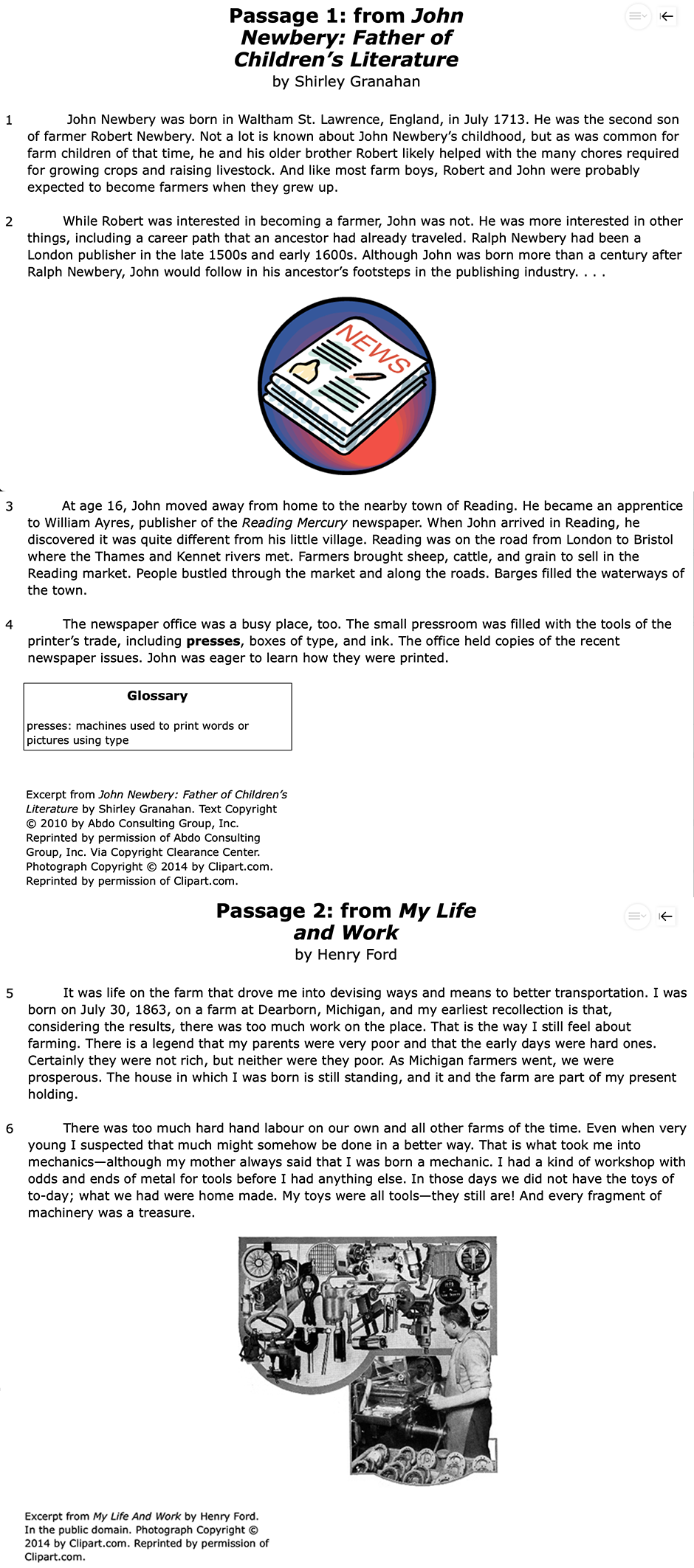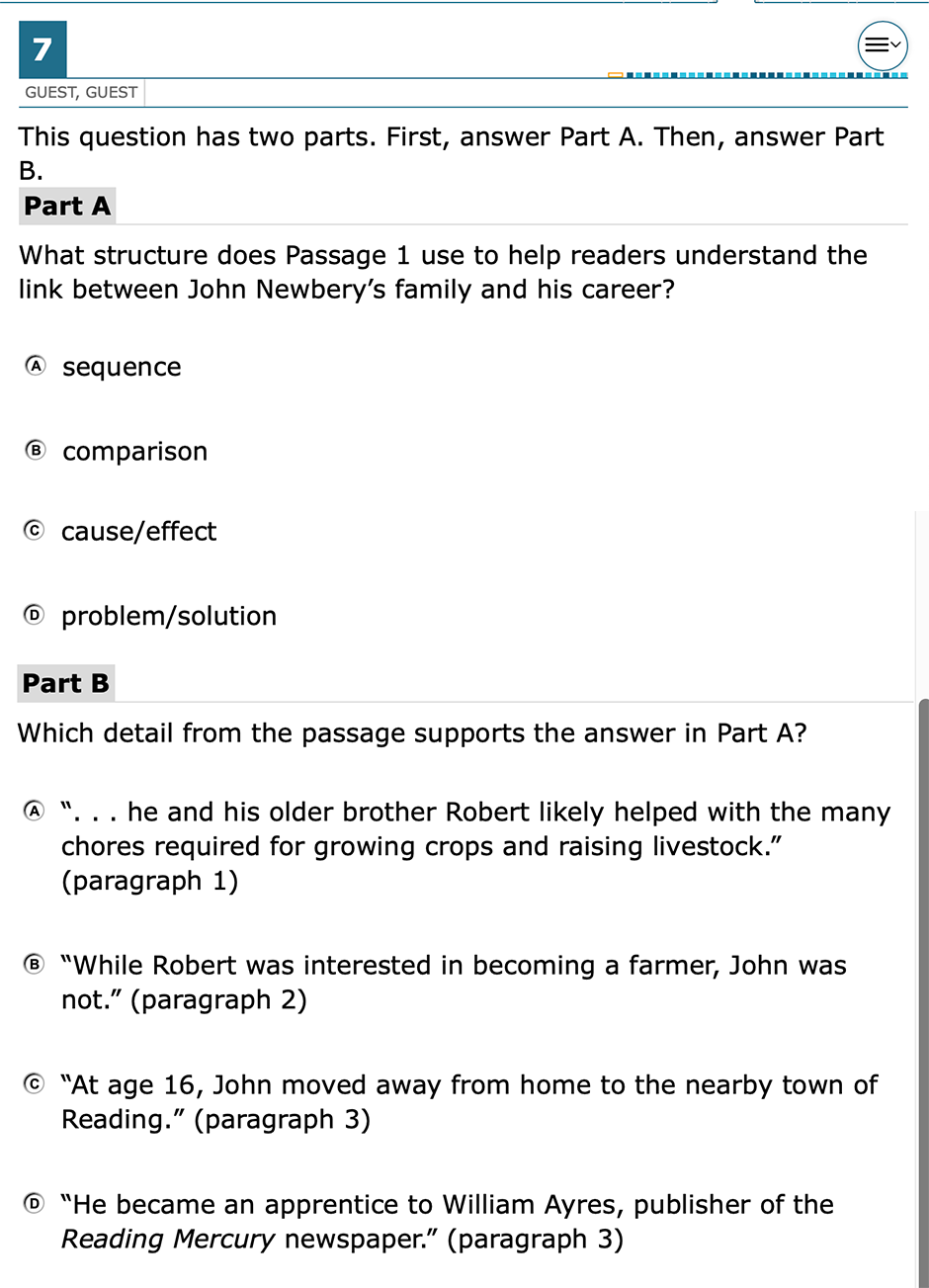The following ILEARN questions were taken from the Indiana Department of Education's Repository Site. They are from the 4th grade English Language Arts evaluation portion of ILEARN. These are questions asked to 9-year-olds & 10-year-olds. To return to the main ILEARN page, click here.
4th Grade: 2019-2020 - Questions 1 & 3


This is an odd question and it’s a poor simplification of the story to state that it teaches “that remembering where you came from is important.” It’s more about how a person’s station in life influences their perceptions and what it takes for them to find contentment. Showing Taizu’s reaction to the soup as both as a pauper and an emperor is a device to provide contrast between those with little and those with much.
Regardless, even if one accepted the premise of the question, none of the provided answers are adequate on their own. A combination of A, C & D somewhat provide an answer, but none of them accomplish it independently.

While the question only allows two sentences to be selected, all three sentences in paragraph 4 demonstrate aspects of how the old woman feels about the soup. It seems clear that the second sentence is intended to be correct, but is impossible to say whether ILEARN intends students to select the first sentence for the woman ironically giving her soup a fancy name or the third sentence for making a general statement about her life that encompasses the soup as well.
4th Grade: 2019-2020 - Questions 5, 7, 8 & 10


A proper test of reading comprehension only includes questions that rely on information presented in the text. This question fails that basic starting point, as it does not mention that Henry Ford worked with cars, yet seems to assume a 9-year-old in 2023 will possess that information. Admittedly, it’s a poor question even with relevant background knowledge. As someone familiar with Mr. Ford, I lean toward D being the correct answer. That said, a strong argument could be made that for these specific two paragraphs, B is more appropriate.

This is a bizarre question because it starts with a false premise. Passage 1 does not establish a link between John Newbery’s family and his career. It states merely that they were farmers and offers some generalities about farming during that time period. It includes no evidence of either Newbery’s thoughts on that profession or that it in any way influenced or impacted his choice of career. Given that the question itself is flawed, it is impossible to know whether ILEARN intends A, B or C to be the correct answer, though D does seem to be wrong enough to rule out.

This question is included mainly to show how difficult it is to evaluate some of the ILEARN questions in the absence of what they intend to be the correct answer. In this case, it is clearly either A or B.
On the one hand, I could see ILEARN arguing that A is incorrect because Newbery had to move to pursue his career, indicating that where someone lives is potentially as important as their interests when it comes to their career.
On the other hand, ILEARN could argue that B is incorrect because while both passages establish that farming has been a job for a long time, neither really emphasizes its importance.
Of course, when a case can be made against either of the potential correct answers, the question has failed.

What sense is a 9-year-old supposed to make of this oddly edited pair of images showing a variety of tools and someone, presumably Henry Ford, working at one of them? C would seem to be flat-out wrong, but cases could be made for or against A, B and D.
4th Grade: 2022-2023 - Question 2

This question does have two correct answers: dreary and dull. I’m including it because it seems absolutely bizarre to expect a 9-year-old to know that the word dull can mean “gloomy, cloudy.”
Dull has lots of meanings, including boring, dumb, muffled, faded, flat and more. It has 11 definitions in Webster’s New World Dictionary. I have heard it used in proper context for 10 of those definitions, but have never heard it used to mean “gloomy, cloudy.”
Given all of its other meanings, none of which would make sense as a substitute for “gloomy” in the accompanying text, it would be an extremely poor word choice for that passage. I could see relying on the obscure definition for something like Jeopardy or a New York Times crossword puzzle, but it’s an extremely odd choice when evaluating the language skills of fourth graders.
Use the following links to explore more bad ILEARN questions.




Comments